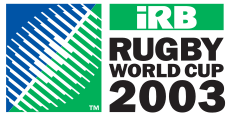2003 Rugby Union World Cup
 |
|
| Tournament details | |
|---|---|
| Host nation |
|
| Dates | 10 October – 22 November |
| No. of nations | 20 (80 qualifying) |
| Final positions | |
|
Champions |
|
| Runner-up |
|
| Third-place |
|
| Tournament statistics | |
| Matches played | 48 |
| Attendance | 1,837,547 (38,282 per match) |
| Top scorer(s) |
|
| Most tries |
(7 tries each) |
|
← 1999
2007 →
|
|
| Qualified for the quarter-finals |
The 2003 Rugby World Cup was the fifth Rugby World Cup and was won by England. Originally planned to be co-hosted by Australia and New Zealand, all games were shifted to Australia following a contractual dispute over ground signage rights between the New Zealand Rugby Union and Rugby World Cup Limited. The pre-event favourites were England, regarded by many at the time as the best team in the world after victories both home and away over New Zealand and Australia, a 50-point hammering of South Africa at Twickenham, and the grand slam in the 2003 Six Nations Championship. New Zealand, France, South Africa and defending champions Australia were also expected to make strong showings, with New Zealand being second favourites after victory in the southern-hemisphere Tri-Nations championship.
The tournament began with host nation Australia defeating Argentina 24–8 at Telstra Stadium in Sydney. Australia went on to defeat New Zealand 22–10 in the semifinal, to play England in the final. Along with a try to Jason Robinson, Jonny Wilkinson kicked four penalties and then a drop-goal in extra time to win the game 20–17 for England, who became the first northern hemisphere team to win the Webb Ellis Cup and become world champions for the first time.
The following 20 teams, shown by region, qualified for the 2003 Rugby World Cup. Of the 20 teams, eight of those places were automatically filled by the teams that reached the quarter-final stages in 1999, including hosts and world champions Australia and did not have to play any qualification matches. A record 81 nations from five continents were involved in the qualification process designed to fill the remaining 12 spots, which began on 23 September 2000.
...
Wikipedia
